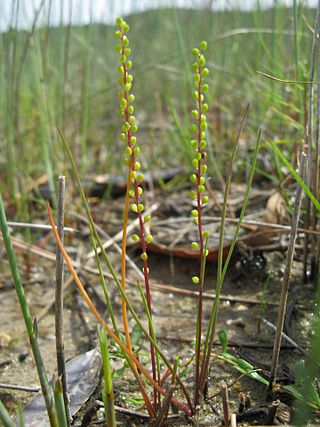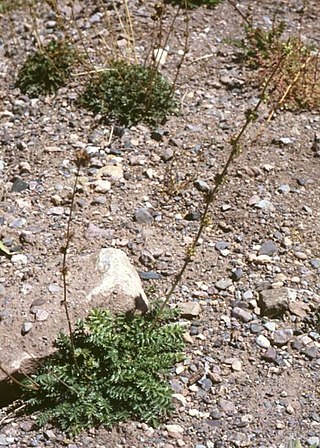
Soliva sessilis is a species of flowering plant in the family Asteraceae. It is one of up to nine species of the genus Soliva and is a low-growing herbaceous annual plant. Its common names include field burrweed, Onehunga-weed, lawn burrweed, lawnweed, jo-jo weed and common soliva. It is one of several plants also known as bindi weed, bindii, or bindi-eye.

Toxicodendron striatum is a South American poisonous tree in the family Anacardiaceae. It is commonly called manzanillo and grows in the tropical rain forests on low elevation slopes.

Iriartea is a genus in the palm family Arecaceae. It is native to Central and South America. The best-known species – and probably the only one – is Iriartea deltoidea, which is found from Nicaragua, south into Bolivia and a great portion of Western Amazonian basin. It is the most common tree in many forests in which it occurs.
Huertea is a genus of plant in family Tapisciaceae. It is native to central and south America. Species include:

Kageneckia lanceolata is a species of flowering plant in the family Rosaceae. It is found in Bolivia and Peru. It is threatened by habitat loss.

Heteranthera is a genus of aquatic plants in the water hyacinth family, Pontederiaceae, known generally as mud plantains. Species of this genus are native to tropical and subtropical America and Africa. They live in the water or in wet soils. They produce leaves on long petioles and some are cultivated for their attractive flowers. Leaves are of two types - linear and submerged or orbicular and floating. Some species have cleistogamic flowers.

Stuckenia pectinata, commonly called sago pondweed or fennel pondweed, and sometimes called ribbon weed, is a cosmopolitan water plant species that grows in fresh and brackish water on all continents except Antarctica.
Broad-leaved pondweed is a common name for several plants and may refer to:

Bowlesia incana is a species of flowering plant, known by the common name hoary bowlesia, in thefamily Apiaceae. It is native to South America and the southeastern and southwestern United States as far north as Washington. It can also be found in Pakistan and New Zealand as an introduced species. It grows in many types of habitat. This is a small annual herb growing thin, spreading stems less than 60 centimeters long. The leaves are borne on long petioles and have multilobed rounded or kidney-shaped blades less than 3 centimeters wide. The green herbage of the plant is coated in fine white hairs. The inflorescences of yellow-green flowers appear in the leaf axils. The tiny inflated fruit is only 2 millimeters wide.

Porlieria is a genus of flowering plants in the caltrop family, Zygophyllaceae. Species within this genus are shrubs or small trees of dry subtropical regions. The generic name honours Spanish ambassador Don Antonio Porlier de Baxamar.

Triglochin striata is a species of flowering plant in the family Juncaginaceae. It is native to New Zealand, South America, America, Africa, Australia and Southern Portugal.

Chaetanthera is a genus of South American flowering plants in the family Asteraceae native to Argentina, Bolivia, Chile, and Peru.

Tillandsia capillaris is a species of flowering plant in the family Bromeliaceae. This species is native to southern and western South America.

Jarava ichu, commonly known as Peruvian feathergrass, ichhu, paja brava, paja ichu, or simply ichu, is a grass species in the family Poaceae native to the Americas. It is found growing in a vast area: Mexico, Guatemala, Costa Rica, El Salvador, Venezuela, Bolivia, Colombia, Ecuador, Peru, Dominican Republic, Chile, and Argentina. It is a common grass of the Andean altiplano. It is used as fodder for livestock.

Acaena pinnatifida is a species of flowering plant in the family Rosaceae. It is known by the common names Argentinian biddy-biddy and California sheepbur. It grows in California, Argentina and Chile. The population from California is sometimes considered to be a distinct species or variety from the population in South America.

Stuckenia is a genus of flowering aquatic plants. It contains approximately 30 species that grow in shallow water. Pondweed is a common name for plants in this genus.

Stuckenia vaginata, commonly called sheathed pondweed, big sheathed pondweed or large-sheathed pondweed is a water plant species that grows in fresh and brackish water in Europe, Northern Asia and North America. Sheathed pondweed is rare, but is not in the 2012 IUCN Red List.
Glinus radiatus is a species of flowering plant in the family Molluginaceae, known by the common name spreading sweetjuice.

Acaena ovalifolia is a species of flowering plant belonging to the family Rosaceae. Its native range is Western South America to Falkland Islands. The plant has been used to treat unspecified medicinal disorders.

Heteranthera reniformis common name kidneyleaf mud-plantain, and mud plantain; is a species of flowering plant in the family Pontederiaceae. It is found in North America. It is listed as a special concern and believed extirpated in Connecticut. It listed as endangered in Illinois and Ohio.
















